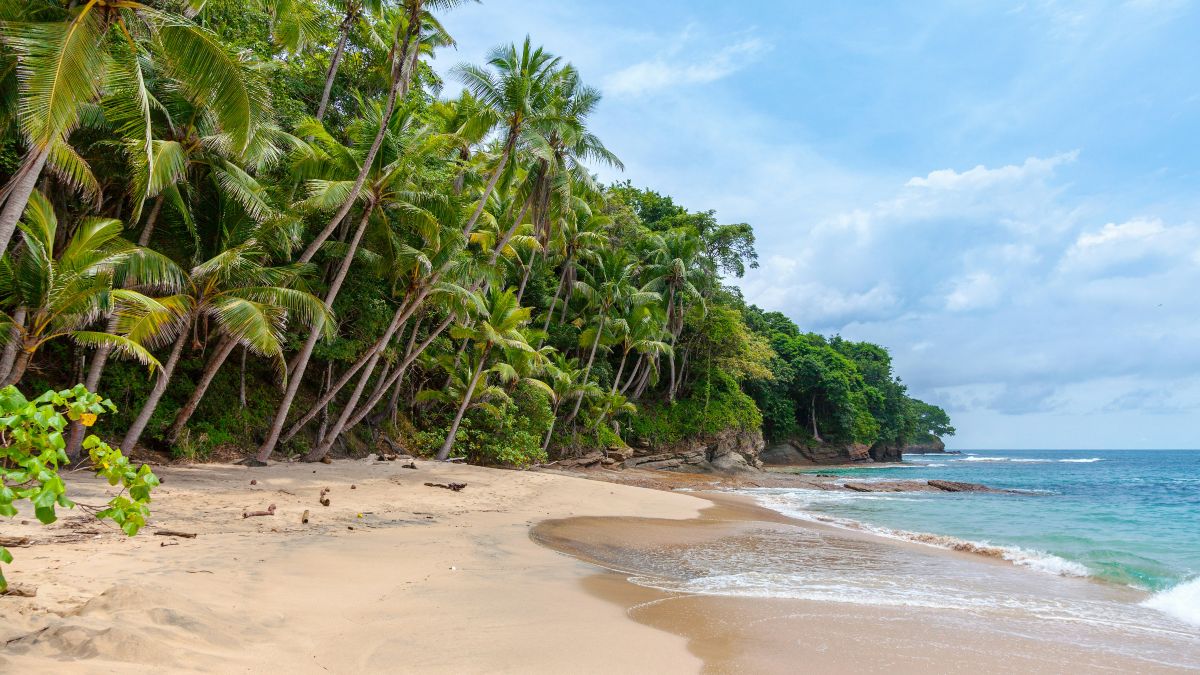Are you sitting in a cold country dreaming of relocating to Central America but you don’t have the money? Is the main question in your head “how can I become financially independent enough to quit my job and make my own way in life down there?” You’re not alone. Here are some ideas to consider that can not only allow you to survive as an expat, but also thrive.
If there’s one thing we learned from the pandemic, it’s this. Our financial security is built on sand. It’s flimsy as all hell, and many of us find ourselves a missed rent payment away from penury. This also goes for expats, many of whom aren’t retired, and didn’t wait for their golden years before heading south to the tropics. I speak from personal experience.
But it’s not all doom and gloom. The pandemic accelerated what was already a growing pre-Covid trend of online entrepreneurship. Nowadays, it’s easier than ever to imagine going out on your own and making a living for yourself on the internet, whether that’s as a digital nomad or not. The idea of digital nomadism is more mainstream than ever, and working from home is normal.
Panama has passed a law to allow remote workers to stay in that country, and Costa Rica is hot on its heels with approved legislation of its own. We compare the two visas as they stand right now. #digitalnomad #remotework https://t.co/hfhGtsXaX0
— CentralAmericaLiving (@VidaAmerica) July 20, 2021
Even if “home” is Central America.
The Facebook expat groups around Central America are full of people asking about how to make money down here, like it’s easy to pick up a job in this part of the world. What they should be asking is how to achieve financial independence working for themselves, so that they don’t need “a job”.
Below, we look at four ways an expat can not only scratch a living for themselves in Central America (or anywhere in the world), but make serious money. Enough money to achieve real financial independence. And certainly more than enough money to more than meet the $3,000 per month minimum earnings requirement stipulated by both Costa Rica’s and Panama’s remote worker visas.
None of the ideas listed below are quick fixes. All take hard work, knowledge, dedication, and a healthy element of luck. They all carry some risk. It could be they’re not for you. But if you’re looking for financial independence in Central America, and you have an open, inquisitive mind, it’s worth taking a look at the following ideas:
Travel Consulting:
If you’re an expat living in Central America, chances are you love to travel. Chances are you have an adventurous and curious spirit, plus a desire to explore and learn about the country you’re living in. If you don’t have any of these traits, chances are you’re not the type of person to up sticks and move to a tropical country in the developing world.
So here’s an idea. How about earning a living helping other people travel to where you’re at? How about learning to create killer vacation itineraries for other people who want to check out Costa Rica, Belize, Panama, Guatemala, or wherever else you are in Central America? Why not become a travel consultant?
The premise is simple. You help people plan their vacations and get paid for it. Many people have very little time. They don’t want to plan every detail of their trip themselves, pouring over TripAdvisor and Facebook reviews for hotels, transfers, car rentals, tours, and so on. They want people on the ground, experts who speak their language, to help them. That’s where you come in.
You’re a travel expert who knows the types of hotels they want, the types of things they want to do based on their personal preferences and what’s available.
It’s because of your expertise that, say, a surfer doesn’t go to Playas del Coco, Costa Rica and a snorkeler doesn’t go to Playa Hermosa. You’re the key.
You can even specialize if you want. Become a specialist in surfing, birding, retirement/relocation trips. How about setting up kickass fishing trips for your clients? The world is your oyster.
Working as a travel consultant means you make deals with the providers (hotels, etc.) to receive a commission from them every time you send them a booking. That’s it in a nutshell. And here’s a little secret… you can make a LOT of money. The potential is unlimited. Travel consultants can pull in thousands of dollars a month. Plus they get to travel around the country checking out luxury hotels and doing cool stuff. It’s a great lifestyle for anyone with some selling skills and a passion for new experiences.
Again, if you have an adventurous spirit, a love for travel, and want to show off the Central American country you now call home, consider becoming a travel consultant.
Trading:
Another great way to find financial independence as an expat is to get into the world of online trading. By that, we mean the practice of buying and selling of – or speculating on the prices of – whatever you want. Stocks, shares, bonds, commodities, currencies, cryptocurrencies, you name it.
The image of trading used to be someone forever on the phone barking “Buy buy!! Sell sell!!” at their broker. Nowadays, things are different. You can do it online without the need of a broker. If you really know what you’re doing, you can even be the broker, working on behalf of your clients from anywhere in the world.
I’m the first to admit… I know very little about this subject (by “very little“, I mean nothing), so it would be helpful if you do know what you’re doing. In fact, I’d recommend you know what you’re doing before venturing down this path to financial independence. It’s a high-risk high endeavor, but if you know what you’re doing, the rewards can be phenomenal. If you don’t know what you’re doing, seek advice from a far better source than this website.
You don’t have to be Warren Buffett to get into online trading. Many thousands of people supplement their incomes from home dabbling on the stock market as a hobby. Monitoring key stocks, such as the WBC stock price on the ASX, can provide valuable insights for making informed trading decisions. There’s no reason why you can’t build up the knowledge and wherewithal to take that up a notch and build your hobby into something more lucrative from your hammock in Honduras.
If stocks and shares aren’t your thing, look at currency speculation, also called, by those in the know, Forex trading.
This is the practice of speculating on the value of currencies as they move up and down against each other. “Forex” means “foreign exchange market” and it’s the largest market in the world. If you can buy an amount of currency in dollars and sell it in, say, Mexican pesos and make a profit on the difference, you’re Forex trading. You can also use Bitcoin or other cryptos to trade in currencies.
To be successful as a Forex trader, it goes without saying that you need to know what you’re doing, well beyond the rudimentary info offered up on this page. Getting some decent software you would help. Many Forex traders use a MetaTrader trading platform to assist them through the technical and analytical skills they need to become successful.
Again, if you want to fund your expat life as a Forex trader (or any other type of trader), please learn at least the bare basics before wading in. Start small, grow gradually, and hopefully you’ll be making good money at a minimal risk.
Beginner’s Guide to Forex Trading – What to Keep In Mind? https://t.co/H1sq675dCr #TSMsmart #startup
— The Startup Magazine (@thestartupmag) October 25, 2021
Freelancing:
We’re painting a broad picture with a large brush here, and it’s difficult to pin down an exact word to cover what we’re talking about. But if you have expertise in any aspect of website design, writing, web developing, coding, SEO, online marketing, project management, consultancy, or anything else you can think of where you can work from wherever you want, you can make money as an expat.
Now we’re not here to show you how to become an expert in whatever field you’re in. You either are or you’re not. And if you’re not, you need to perfect your craft and become hirable to others in this age of ChatGPX. We’re here to offer some guidance on how to market your skills to others while living the expat life in Central America.
So how do you do this? Well, you can start on platforms like Fiverr and Upwork, but for real financial independence, you’ll end up dropping these as soon as possible. They’re nice places to start, but they can be races to the bottom as you compete with workers all over the world. If you must operate through a freelancing platform, work your way to becoming one of the top 3% in the world at your craft and join Toptal.
This platform is hard to join – you have to be very good at what you do – but once you’re in, you’ll make real money.
We know it sounds flippant to tell you to become one of the top 3% in the world at what you do.
That ain’t easy, I know. But if you want to make the big bucks, you have to aspire to that. Take a look around Toptal and see for yourself. Other higher-end platforms include Contently, Flexjobs, and Dribbble. Some of these are paid services, but they offer access to better jobs with big name clients.
Don’t get me wrong, Upwork and Fiverr are okay places to start. But the big bucks are elsewhere. Also look at sites like We Work Remotely that aren’t freelance platforms at all. They’re marketplaces that connect clients and freelancers who are free to work out details and payments directly with each other.
Ideally, you want to have other client sources away from any of these sites. That’s where good old word of mouth recommendations come in. Highlight those with your own online portfolio. Building your own is easier than ever nowadays with platforms like Wix. And if your speciality is, say, WordPress, what better way to advertise your trade than through your own site?
And don’t forget the power of social media, either. Get yourself on LinkedIn and start connecting like crazy. Build a Facebook page. Set up an Instagram account. Use Twitter. Work hard at your craft and harder at promoting your craft and you’ll build financial independence in Central America.
Thinking about freelancing? Take a look at what freelancers say are the best things about their work life. #FutureOfWork #RemoteIsTheNewOffice pic.twitter.com/kHQ9Sd9a2o
— Toptal (@toptal) September 13, 2021
Creating online courses:
To tie all this together, here’s a super-lucrative way to earn a decent living for yourself as an expat. Start creating online courses. Teaching others how to do something is all well and good. There are tons of English teachers in Central America, for example. Pre-pandemic, many English teachers taught face-to-face, at schools and institutions around the region. Since then, much of that work has gone online.
Teaching online gives you freedom to not only teach Central Americans, but also non-English speakers elsewhere in the world, like China. Teaching Chinese students online is where the real money is in the TEFL world, so they say. The only issue with that is, if you’re in Central America, the time difference is pretty brutal.
But do you want to know where the REAL real money is in online education? It’s not teaching students yourself.
It’s in creating the courses or syllabuses other teachers use to teach their students. That’s where the big bucks are.
If you’re a qualified, experienced TEFL teacher working for an institution, you might well have thought you create better material than the stuff you’re working with. Or, if you’re a total freelancer working for yourself, you’ve created all your own prep work for your classes anyway. If that stuff is good, why not put it together and sell it?
Putting in the time to create your own syllabus, a syllabus so good that others want to use it will make you money. Market it well enough and you can copyright it and sell it all over the world, creating a great piece of passive income for yourself between updates.
And why stop at TEFL courses?
You can create a course on anything you want. Anything. Look at all the skills we mentioned in the sections above about freelancing, currency trading, and travel consulting. You can create courses on all three of these things. If you’re a coder, build a beginners course about, say, Python. Online marketers can create courses on how to market online. Entrepreneurs can create courses on making money. Everyone wants to learn how to make money.
Create a course on becoming a better writer, on meditation, on dog grooming, on beer brewing, on anything you want. If you can market it well enough, someone will buy it. And if it’s good enough, more people will, and you’ll make money.
If you become good a creating courses, you can even hire yourself out to create courses for other people and businesses. But please make sure you know what the hell you’re creating a course about. Be an expert in your field. If you’re not, you’ll be found out, and the whole thing will be a massive waste of time. Course building is hot right now, so if you do have a skill others want to learn, take a course about creating courses and dive right in.
How to make money creating online courses https://t.co/sG2lvpDp6T pic.twitter.com/qFID7U9n3U
— Angela Giles (@angelaksgiles) October 26, 2021
None of the above ways of creating financial independence as an expat come easy.
There’s risk and hard work involved in them all and we’re not talking get rich quick schemes here. You won’t find me suggesting you become an Instagram influencer or a TikTok star. Life ain’t that simple.
Plus, you shouldn’t limit yourself to one income stream, either.
There are plenty of other things you can look at instead of, or alongside the ideas listed above. Import/export, affiliate marketing, video production, you name it. All it takes is hard work and application.
But, if you take any of the above options seriously and apply yourself, there’s no reason why you can’t kiss off your old boss for good, and make it out there on your own as a financially independent expat living in paradise.
Good luck out there!
James Dyde is the editor of centralamerica.com. He lives in Escazu, Costa Rica.




